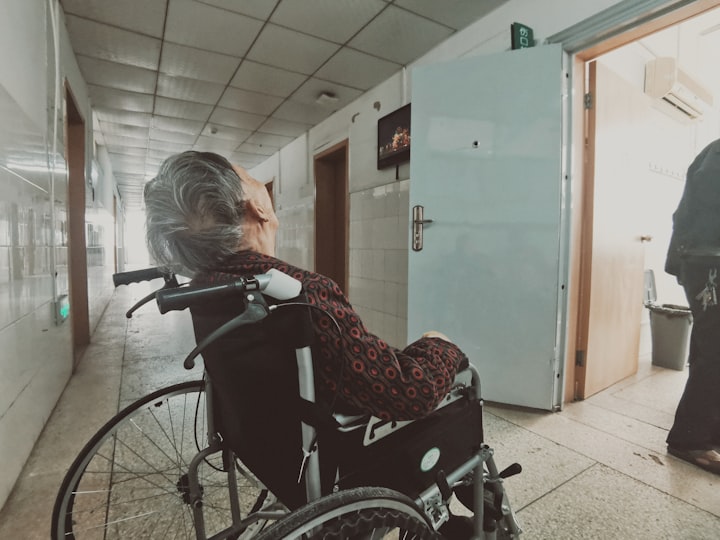Alzheimer's Disease -- A Long Goodbye
How to prevent and manage this dis-ease
God gave us our memories so that we might have roses in December --James M. Barrie
Alzheimer’s is a cruel disease. Unlike many others, it leaves family, friends, and caregivers to mourn for an inordinate length of time.
You witness your loved one fading until they are no longer present.
Many years ago I worked as a caregiver to a man who was stricken with Alzheimer’s disease. He, by my estimate, was just entering the final stages of severe Alzheimer’s. Many of the symptoms below are so familiar to me in retrospect.
Thankfully Alzheimer’s disease is not/should not be a normal consequence of the aging process! Imagine that the greatest risk factor of developing this disease is “aging”.
Aging, a process in which we have no choice!
More than 5 million Americans, their families, and caregivers are currently living under the enormous constraints of this disease. It is currently the sixth-leading cause of death.
But the aged are not the only ones affected, more than 200,000 Americans under the age of 65 have what is considered early-onset Alzheimer’s.

Pathophysiology of Alzheimer’s Disease
Although Alzheimer’s is considered a type of dementia, that diagnosis in and of itself is not actually the disease.
Dementia occurs as a symptom of this disease. It is also a term used to categorize some of those symptoms, such as deficits in memory, judgment, and other intellectual behaviors of cognition.
Alzheimer’s disease is a progressive disorder of the brain that will eventually impact your memory, your ability to think, communicate, to process language and emotions until you are unable to carry out even the simplest tasks of daily living.
How and why it occurs is not yet understood but scientists think abnormal clumps of proteins called amyloid plaques and tangled bundles of fiber called tau or neurofibrillary bundles contribute to this monstrous disease.
It is also believed that the changes begin decades before the first symptoms are seen. The disease first develops in the memory-forming hippocampus and entorhinal cortex which plays an essential role in memory formation.

Alzheimer’s and your brain
The human brain contains approximately 100 billion nerve cells (neurons) tasked with being the control center of the body. Each nerve cell connects with many others forming a communication network. Each group of nerve cells performs a specific task.
These special cells signal the body about how/when to process thoughts, sounds, light, sight, motor processes and gives us the ability to recall and apply information learned.
To do their work, brain cells must operate like tiny efficient factories. They receive stimuli and sustenance and in return provide the necessary feedback allowing us to be “present” in the process of living.
Scientists so far have been unable to pinpoint where, how, and why the breakdown in the network initially begins. As this breakdown in communication continues, the machine loses its ability to operate efficiently and fails eventually ceasing to function altogether.
Symptoms of the disease
- Inability to recall recent information, places, names, events
- Mental confusion about time and place
- Confusion or inability to complete familiar everyday tasks
- Difficulty in articulation
- Impaired judgment
- Unexplained personality changes.

Three stages of Alzheimer’s Disease
Mild — — It is usually at this stage that a diagnosis is made. Affected persons experience and exhibit greater memory loss and cognitive difficulties. They may begin to wander, become easily lost, and have difficulty in handling basic everyday tasks. They begin to ask the same questions many times while taking longer to complete simple everyday tasks and may begin having behavior and personality changes.
Moderate — — At this stage the areas of the brain that control language, reasoning, sensory processing, and conscious thought are damaged and more deficits become evident. Patients begin to have problems recognizing family and friends, unable to process new information, demonstrates an inability to get dressed, and are emotionally unable to cope. They may showcase impulsive behaviors and are prone to hallucinations, delusions, and paranoia.
Severe — — As the plaques and tangles become more prominent, the brain tissue shrinks significantly (see image above). The inability to communicate and complete dependency occurs at this stage.

What You can do to prevent early-onset
- Working a mentally stimulating job
- Crossword puzzles
- Jigsaw puzzles
- Learning new tasks, e.g new language, new skills
- Memorization exercises
- Proper diet and exercise
- Get lots of vitamins C and E
- Maintain healthy cholesterol levels
- Keeping your mind and body limber throughout your life has been shown to benefit you in your later.
- Proper diet and exercise promote good health in general and may ward off countless diseases including Alzheimer’s onset. Eat a diet containing fish oils, Vitamin E, and Vitamin C.

Management
- Currently, this disease is managed with medications and behavioral therapy. The aim of management is to:
- Slow the progression of the disease as much as possible.
- Assist in the maintenance of mental function.
- Manage adverse behavioral symptoms of the disease.
- Is there a cure?
- At this time there is no known cure!
Life expectancy according to the Alzheimer’s Foundation ranges from four to eight years after diagnosis.
Grim facts!
Research
Research has shown that people who scored lower on cognitive ability tests when young were more likely to develop Alzheimer’s later in life. Early cognitive ability was measured based on writings done by the nuns while in their early 20’s.
Persons showing more “idea density” i.e. the number of ideas expressed using the least amount of words coupled with better linguistic and grammar skills had a much lower incidence of Alzheimer’s later in life.
Scientists are of the opinion that good cognitive skills early on creates a sort of “neurocognitive reserve” which will be drawn on later, effectively preventing Alzheimer’s.
Exercising and improving cognitive skills via writing, reading, and learning — anything that stimulates the brain — may go a long way toward active, clear-headed, and graceful aging.
Research is also exploring why Alzheimer’s disease affects two-thirds more women than men?
Writers and creators, you are working on creating that mental reserve, so keep on creating!

Final thoughts
While there is believed to be a genetic component that predisposes someone to the risk of Alzheimer’s, awareness, early planning, mental exercise, and smart dietary choices may aid and even reduce your likelihood of developing this awful and debilitating disease.
A healthy mind and a healthy body now will make for a healthy mind and body later.
Be mindful of how your current choices will impact you in the future.
Be kind to each other, especially persons suffering from memory issues, give them love, comfort, and help them to always feel safe.
Resources:
https://alzfdn.org/caregiving-resources
https://www.alz.org
https://www.nia.nih.gov
https://www.cdc.gov
About the Creator
She Writes
She Writes - A girl writing the way she sees the world -- email [email protected]







Comments
There are no comments for this story
Be the first to respond and start the conversation.